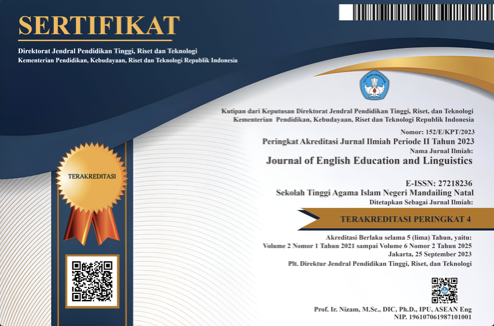INTROVERT PERSONALITY: CHALLENGING IN SPEAKING CLASS
DOI:
https://doi.org/10.56874/jeel.v4i2.1628Keywords:
Introvert, Challenging, SpeakingAbstract
The purpose of this research is to find out the challenges of introverted students in practising speaking skills in speaking class. As we know, an introverted personality usually feels shy to speak something in front of a crowded situation. This research investigated the difficulties and the strategies of introverted students in gaining good performance in speaking class. This research used a purposive sampling technique. The sample of this research is 4 students from one of the universities in Lampung. For gaining the introvert sample, this research used Eysenck’s Personality Inventory (EPI). This research is qualitative. The data collecting technique used interviews. The result indicated that there are many challenges in speaking for introverted students. It is because they must face many difficulties to do well performance in speaking class. There are five challenges in speaking class for introverted students namely having a lack of self-confidence, feeling shy, fear of making mistakes, and lack of knowledge. Based on the interview, all introverted students have the same strategy in gaining good performance in speaking class namely well preparation before performing in speaking class. They do a lot of practice before performing in speaking class.
References
Angreini silva, Musiman & Dyah sih pratiwi. (2023). Teachers’ and Students’ Perception on the Use of Cake Application Towards Their Speaking Skill on Merdeka Belajar Era.Elt-Lectura: Studies and Perspectives In English Language Teaching Vol.10 Number 2, e-ISSN 2550-0724
Ariyanti. (2016). Psychological Factors Affecting EFL Students’ Speaking Performance. Journal of Asian TEFL Vol. 1 No.1 e-ISSN 25032569.
Delaney, J.G., Johnson, A.N., Johnson, T.D., et al. (2010). Students’ Perception of effectiveness in higher education. 26th Annual Conference on Distance Teaching and Learning, University of Wisconsin.
Elfiza, R. (2017). The Effect of Using Adventure Game andPicture on Introverted Students’ Speaking Skill.Proceeding of International Conference on Art,Language, andCulture. 2(1), 357-366.
Giri Aditama, M., Haryanti, D., & Wulan Sari, F. (2020). The Advantages of Personal Documentation Video in Improving Students’ Speaking Skill for Presentation.
Hakim, M. A. R. (2017). Teachers' Strategies in Teaching Speaking Lessons on Introverted Students in Madrasah Aliyah (MA) JA-ALHAQ Bengkulu. Madania: Jurnal Kajian Keislaman, 21(1), 23-30.
Harmer, J. (2007). The Practice of English Language Teaching: Fourth Edition. England: Pearson Education Limited
Kawulich, B. B. (2012). Collecting Data Through Observation. United States of America: University of West Georgia.
Pratiwi, D. S., & Prihatini, C. (2021). Problems And Difficulties Of Speaking At Muhammadiyah Lampung University Students In Covid Pandemic. JE2L: Journal of English Education and Lingusitic. Volume 2, Number 1 e-ISSN: 2721-8236
Varela, O.E., Cater, J.J. & Michel, N.(2012). Online Learning in Management Education: An Empirical Study of The Role of Personality Traits. Journal of
Computing in Higher Education,24, 209-255.
Weiten, W., Dunn, D. S., & Hammer, E. Y. (2012) Psychology Applied to Modern Life: Adjustments in the 21st Century. Belmont, CA: Wadsworth.
Downloads
Published
Issue
Section
License
All articles published in the Journal of English Education and Linguistics are licensed under a Creative Commons Attribution-ShareAlike 4.0 International (CC BY-SA) license. This means anyone is free to copy, transform, or redistribute articles for any lawful purpose in any medium, provided they give appropriate attribution to the original author(s) and Journal of English Education and Linguistics, link to the license, indicate if changes were made, and redistribute any derivative work under the same license.
Copyright on articles is retained by the respective author(s) without restrictions. A non-exclusive license is granted to the Journal of English Education and Linguistics to publish the article and identify itself as its original publisher, along with the commercial right to include the article in a hardcopy issue for sale to libraries and individuals.
Although the conditions of the Creative Commons Attribution-ShareAlike 4.0 International (CC BY-SA) license do not apply to authors (as the copyright holder of your article, you have no restrictions on your rights), by submitting to the Journal of English Education and Linguistics, authors recognize the rights of readers and must grant any third party the right to use their articles to the extent provided by the license.

This work is licensed under a Creative Commons Attribution-ShareAlike 4.0 International License.








